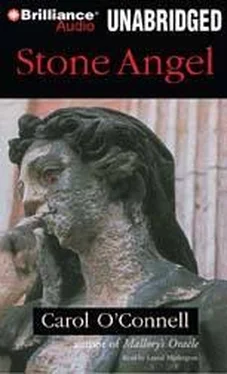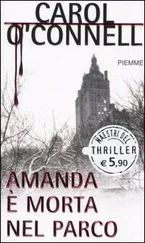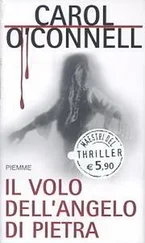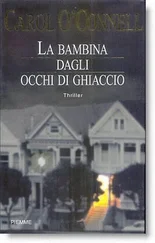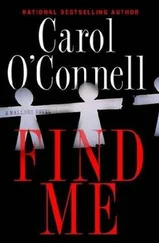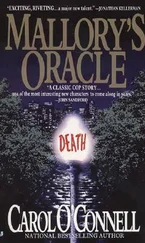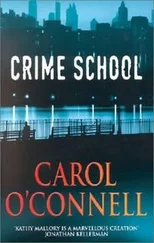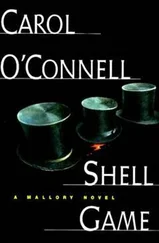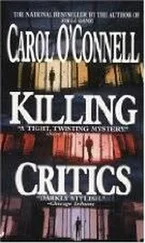That had been the most likely window of opportunity, and it would account for the setback in Ira’s therapy. The child would have been terrified when Babe did the healing act, the laying on of hands. He would have been screaming. Malcolm would have played the role of the calming influence. He would have taken the child away to some quiet place. If Ira had screamed again, if anyone had overheard, who would have guessed the real reason for it? No one – not even his own father seated in the audience that night, perhaps only steps away from his small son during the abuse.
If Darlene had followed this much, she was willing the image away, slowly shaking her head. The dry cake crumbs, crushed to a finer dust, fell from her hand to spread over the tray, the table, and some trickled to the floor.
“It must have been hard for Babe to watch Cass Shelley die,” said Charles. “Cass was his doctor once. Probably the only one who had ever cared what happened to him. Then Mallory appeared – the image of her mother. And Ira began to play those notes over and over on the piano. Those same notes were playing on a scratched record all the while Cass was being stoned by the mob. Babe went wild. He might have yelled at Ira to stop. But you know Ira would have blocked that out and kept on playing. At this stage of Babe’s disease, he couldn’t have handled any frustration. So he slammed the piano lid on Ira’s hands to make the music stop. When the music did stop, the assault was over.”
“But Babe was lying in wait for Mallory.” Louder now, insistent, “He was going to ambush her!”
Her coffee cup crashed to the floor.
The room quieted for a moment. Then the other patrons resumed their conversations, but everywhere about the room, eyes were trained on the dark stain spreading across the floor and the woman who might be dangerously crazy.
“I rather doubt that Babe meant to harm Mallory,” said Charles. “Perhaps he dimly saw her as Cass, an old source of comfort, an easer of pain. Or maybe he was lucid and wanted to talk to Mallory about the day her mother died. That might explain why the brothers fought in the square and again at the gas station. But we’ll never know. It’s always a tricky thing – second-guessing the dead.”
It began with quiet tears, and then she was trembling. Stutters of breath were choked up in her throat, emerging now as racking sobs. The people seated around them had finally redirected their eyes to their own affairs. Tears were the norm in this place, and Darlene’s seemed to comfort all of them, saying there was nothing dangerous here – only death and pain.
Charles patiently waited out the crying, occasionally handing her napkins. When she was composed again, he fetched another piece of cake and opened the wrapper for her.
She tried to give him a smile for the cake, and she failed. “No one gave a damn who killed Babe Laurie. Only you.”
“Oh, that’s not true,” said Charles. “They were liars, every one of them who said Babe’s death didn’t matter. They all thought someone they cared about had done it.”
Well, Mallory might have believed the sheriff had killed Babe Laurie. When pressed, she had pointed him in Jessop’s direction, hadn’t she? But Charles remained uncertain. It was always so hard to tell when Mallory was lying. She might have reasoned that Tom Jessop could easily fend off a false accusation; but if Darlene had gone to prison, who would’ve looked after Mallory’s old playmate? It would be just like her to choose the expedient -
“Charles, what do you think the court will do with me?” Darlene’s words were listless. She was calm now, and seemed only mildly curious about her future.
“Tom Jessop is a very decent man. He’ll have a strong influence on what happens to you.” Jessop would certainly support a plea of temporary insanity for the crime of mother passion. “I suppose your best outcome would be probation.”
“And if you were on my jury?”
“Would I ask for a pound of flesh? No.”
Babe’s life would have been absolute hell if he’d been allowed to live it out. The best medical treatment in the world might have eased the suffering, but not reversed the insidious damage. “However, I do regret Babe’s murder – particularly the way he died.”
“All alone and scared,” she said, nodding. “Left to bleed to death like a dog in the road.”
She was in accord with him now, sharing his regret, her face set with real grief. And pity? Yes, that too. So, the death of Babe Laurie had mattered a great deal. And now the dead man was assured of one mourner, his own murderer, a woman who would certainly visit his grave to bring him the odd bouquet of guilty flowers.
The night was mild, and so she was without her black duster. The pale blue jeans and white shirt had made it easy to follow her in the gathering darkness. Though Charles had trailed Mallory here, he made no move toward her, but kept to the darkest shadows in the ring of trees, silent as a parishioner in church.
She stood on a small patch of open ground at the center of the cemetery, where two gravel roads met in the form of a cross. Just behind her was the movement of something small and alive racing through the grass in a line of bowing fronds. A bird of prey crossed the sky in a glide and then descended in a lazy circle, settling to earth. In the grass at the owl’s feet, a tiny animal screamed, and the night bird rushed up to the stars.
Mallory’s head tilted back, and at first, Charles thought she was only following the flight of the owl. But no, something else was going on here, and it was suspiciously close to a religious act. She was looking up at the sky, not in admiration for the holy handiwork in the firmament, nor with the aspect of worship, but it definitely was a communion of sorts.
Were there obscenities in her eyes?
Whatever did Heaven read in that angry face of hers? For now, in a sudden rush of wind, it began to cover its own vast face with clouds, and the conversation was ended, debate lost by default.
Disrespecting borders, she stalked across gravel and onto the grass, moving between the carved monuments and tombs. She paused by the stone that meant the most to her, and then Mallory moved on.
Now he only followed her with his eyes until she disappeared into Henry’s woods. She re-emerged, climbing the levee in long graceful strides. When she reached the top, she stood still for a moment, looking down on the cemetery. He pulled back into the circle of trees.
Though there would be days on the road before they separated, in a way, he was saying goodbye to her. Their actual parting would be more mundane; she would slip off into the canyons of New York skyscrapers and forget him. And for his part, he would cease to debase himself by following after her, doglike, growing smaller in her eyes until he altogether vanished.
The clouds were dispersing in a network of lace to expose the constellations. And now he had a small insight on the poetry of Ira’s vision, freed of conceptions of space and time, mass and the radiant energy of distant lights. Low-hanging stars winked in and out with her passage across the levee road. There was no hard line of demarcation between the heavens and the high earthen barrier. In his fractured perception, she was walking across the sky.
Goodbye, Kathy Mallory.
He said her name again, aloud this time, and now another connection was taking place, almost against his will. He climbed into Mallory’s point of view, an uncomfortable and cramped place to be, for she was only six years old, going on seven. The child in the closet had heard no sound from her mother, only the one voice speaking to the silent mob. The words may not have been clear, but the voice would have been recognized. Thoughts of the child were linking to Malcolm, whom those of long acquaintance called Mal.
Читать дальше
